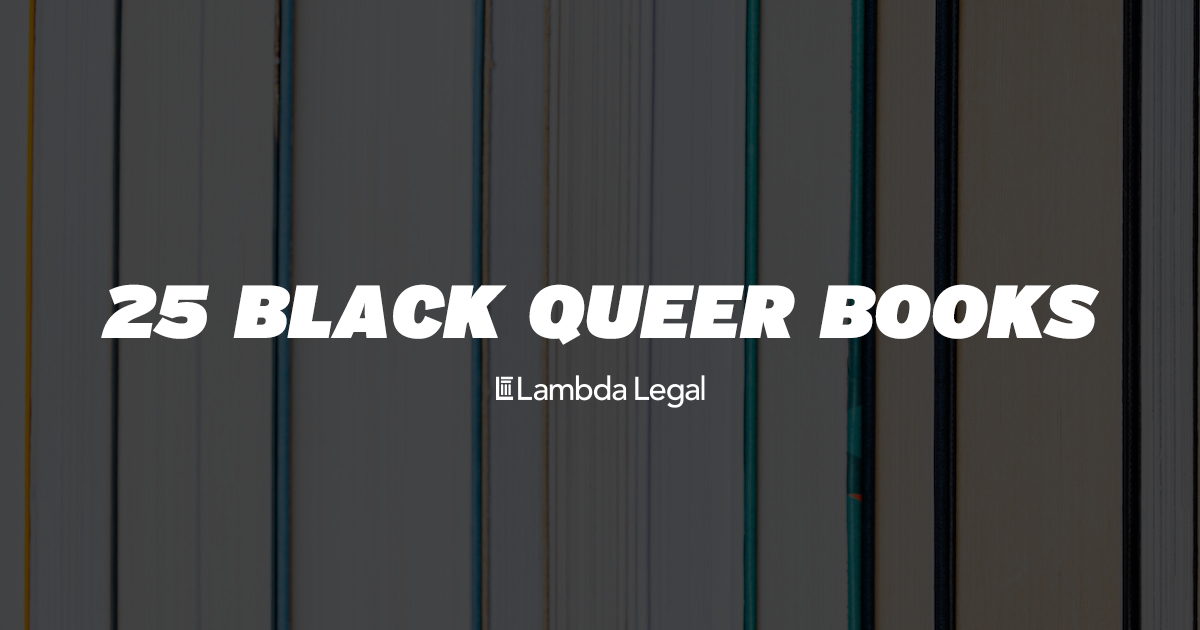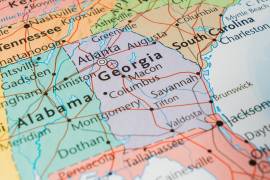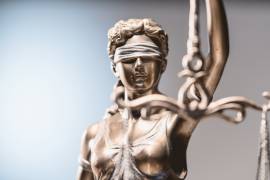We observe Pride Month in June to commemorate the Stonewall riots, a rebellion against police brutality that erupted in New York City in June of 1969. This year, as protests against the systemic criminalization and destruction of Black lives endure across the country, we are ever more profoundly reminded of this history. We owe the birth of the modern LGBTQ rights movement to the Black and brown trans and queer people who sparked this rebellion 51 years ago.
Our country’s violent history against Black people is inexorably linked to its violent history against LGBTQ people.
Below, we have compiled an anti-racist reading list by, about, and for Black LGBTQ people. We ask that you join in the fight against white supremacy and help us honor the lives of Nina Pop, Tony McDade, George Floyd, Ahmaud Arbery, Breonna Taylor, and countless others by listening to and learning from Black queer voices. If you can, purchase these titles at a Black-owned bookstore near you.
As acclaimed Black lesbian activist Angela Davis said, “In a racist society, it is not enough to be non-racist, we must be anti-racist.”
White Rage: The Unspoken Truth of Our Racial Divide by Dr. Carol Anderson
From the Civil War to our combustible present, White Rage reframes our continuing conversation about race, chronicling the powerful forces opposed to Black progress in America.
Giovanni's Room by James Baldwin
In the 1950s Paris of American expatriates, liaisons, and violence, a young man finds himself caught between desire and conventional morality. With a sharp, probing imagination, James Baldwin's now-classic narrative delves into the mystery of loving and creates a moving, highly controversial story of death and passion that reveals the unspoken complexities of the human heart.
Go Tell it on the Mountain by James Baldwin
With lyrical precision, psychological directness, resonating symbolic power, and a rage that is at once unrelenting and compassionate, Baldwin chronicles a fourteen-year-old boy's discovery of the terms of his identity as the stepson of the minister of a storefront Pentecostal church in Harlem one Saturday in March of 1935. Baldwin's rendering of his protagonist's spiritual, sexual, and moral struggle of self-invention opened new possibilities in the American language and in the way Americans understand themselves.
Jam on the Vine by LaShonda Barnett
Jam on the Vine chronicles the life of trailblazing African American woman journalist, Ivoe Williams, through the start of the twentieth century. In unflinching prose, we follow Ivoe and her family from the Deep South to the Midwest. Jam on the Vine is both an epic vision of the injustices that defined an era and a compelling story of a complicated history we only thought we knew.
The Tradition by Jericho Brown
The Tradition details the normalization of evil and its history at the intersection of the past and the personal. Brown's poetic concerns are both broad and intimate, and at their very core a distillation of the incredibly human: What is safety? Who is this nation? Where does freedom truly lie? Poems of fatherhood, legacy, Blackness, queerness, worship, and trauma are propelled into stunning clarity by Brown's mastery.
HoodWitch: Poems by Faylita Hicks
HoodWitch is a reclamation of power for Black women and nonbinary people whose bodies have become the very weapons used against them. HoodWitch tells the story of a young person who discovers that they are “something that can & will survive / a whole century of hunt.” Through a series of poems based on childhood photographs, Hicks invokes the spirits of mothers and daughters, sex workers and widows, to conjure an alternative to their own early deaths and the deaths of those whom they have already lost.
Bad Feminist by Roxane Gay
Roxane Gay takes us through the journey of her evolution as a woman of color while also taking readers on a ride through culture of the last few years and commenting on the state of feminism today. Bad Feminist is a sharp, funny, and spot-on look at the ways in which the culture we consume becomes who we are, and an inspiring call-to-arms of all the ways we still need to do better, coming from one of our most interesting and important cultural critics.
Speak No Evil by Uzodinma Iweala
A revelation shared between two privileged teenagers from very different backgrounds sets off a chain of events with devastating consequences. Speak No Evil explores what it means to be different in a fundamentally conformist society and how that difference plays out in our inner and outer struggles. It is a novel about the power of words and self-identification, about who gets to speak and who has the power to speak for other people.
Black. Queer. Southern. Women.: An Oral History by E. Patrick Johnson
Drawn from the life narratives of more than seventy African American queer women who were born, raised, and continue to reside in the American South, this book powerfully reveals the way these women experience and express racial, sexual, gender, and class identities —all linked by a place where such identities have generally placed them on the margins of society.
No Tea, No Shade: New Writings in Black Queer Studies by E. Patrick Johnson
No Tea, No Shade brings together nineteen essays from the next generation of scholars, activists, and community leaders doing work on Black gender and sexuality. This collection's contributors speak new truths about the Black queer experience while exemplifying the codification of Black queer studies as a rigorous and important field of study.
How We Fight for Our Lives: A Memoir by Saeed Jones
Jones tells the story of a young, Black, gay man from the South as he fights to carve out a place for himself, within his family, within his country, within his own hopes, desires, and fears. He draws readers into his boyhood and adolescence — into tumultuous relationships with his family, into passing flings with lovers, friends, and strangers. Each piece builds into a larger examination of race and queerness, power and vulnerability, love and grief: a portrait of what we all do for one another — and to one another — as we fight to become ourselves.
Passing by Nella Larsen
Clare is married to a racist white man unaware of her African American heritage, and has severed all ties to her past after deciding to “pass” as a white woman. Clare’s childhood friend, Irene, just as light-skinned, has chosen to remain within the African American community. Clare’s interest in Irene turns into a homoerotic longing for her Black identity that she abandoned and can never embrace again, and she is forced to grapple with her decision to pass for white in a way that is both tragic and telling.
A Garden for Black Boys by WJ Lofton
A Garden for Black Boys invites the reader into a world where tough questions are unpacked and answers are presented raw, extremely intimate, and containing a breath of their own. Each poem applauds the humanity of Black people, that is often overlooked in America. Inspired by tragedy, the continual shootings of unarmed Black men and women, the author labors out a rallying cry that not only wreaks of grief but determined hope; a possibility to see a better tomorrow.
Sister Outsider: Essays and Speeches by Audre Lorde
In this charged collection of fifteen essays and speeches, Lorde takes on sexism, racism, ageism, homophobia, and class, and propounds social difference as a vehicle for action and change. Her prose is incisive, unflinching, and lyrical, reflecting struggle but ultimately offering messages of hope.
Zami: A New Spelling of My Name by Audre Lorde
Zami is a fast-moving chronicle. From the author’s vivid childhood memories in Harlem to her coming of age in the late 1950s, the nature of Audre Lorde’s work is cyclical. It especially relates the linkage of women who have shaped her. Lorde brings into play her craft of lush description and characterization. It keeps unfolding page after page.
Black Girl Dangerous: On Race, Queerness, Class and Gender by Mia McKenzie
McKenzie's nuanced analysis of intersecting systems of oppression goes deep to reveal the complicated truths of a multiply-marginalized experience. McKenzie tackles the hardest questions of our time with clarity and courage, in language that is accessible to non-academics and academics alike. She is both fearless and vulnerable, demanding and accountable.
Brown White Black: An American Family at the Intersection of Race, Gender, Sexuality, and Religion by Nishta J. Mehra
Brown White Black is a portrait of Nishta J. Mehra's family: her wife, who is white; her adopted child, Shiv, who is Black; and their experiences dealing with America's rigid ideas of race, gender, and sexuality. Mehra writes candidly about her efforts to protect and shelter Shiv from racial slurs on the playground and from intrusive questions by strangers while educating her child on the realities and dangers of being Black in America. She discusses growing up in the racially polarized city of Memphis; coming out as queer; being an adoptive mother who is brown; and what it's like to be constantly confronted by people's confusion, concern, and expectations about her child and her family.
Redefining Realness: My Path to Womanhood, Identity, Love & So Much More by Janet Mock
With unflinching honesty and moving prose, Janet Mock relays her experiences of growing up young, multiracial, poor, and trans in America, offering readers accessible language while imparting vital insight about the unique challenges and vulnerabilities of a marginalized and misunderstood population. Though undoubtedly an account of one woman’s quest for self at all costs, Redefining Realness is a powerful vision of possibility and self-realization, pushing us all toward greater acceptance of one another — and of ourselves — showing as never before how to be unapologetic and real.
Not Straight, Not White: Black Gay Men from the March on Washington to the AIDS Crisis by Kevin Mumford
This compelling book recounts the history of Black gay men from the 1950s to the 1990s, tracing how the major movements of the times — from civil rights to Black power to gay liberation to AIDS activism — helped shape the cultural stigmas that surrounded race and homosexuality. Mumford explores how activists, performers, and writers rebutted negative stereotypes and refused sexual objectification. Examining the lives of both famous and little-known Black gay activists, he analyzes the ways in which movements for social change both inspired and marginalized Black gay men.
The Women of Brewster Place by Gloria Naylor
Gloria Naylor weaves together the stories of seven women living in Brewster Place, a bleak-inner city sanctuary, creating a powerful, moving portrait of the strengths, struggles, and hopes of Black women in America. Vulnerable and resilient, openhanded and openhearted, these women forge their lives in a place that in turn threatens and protects — a common prison and a shared home. Naylor renders both loving and painful human experiences with simple eloquence and uncommon intuition.
Time on Two Crosses: The Collected Writings of Bayard Rustin edited by Donald Weise and Devon W. Carbado
In 1956, Bayard Rustin taught Martin Luther King Jr. strategies of nonviolence during the Montgomery Bus Boycott, thereby launching the civil rights movement. Widely acclaimed as a founding father of modern Black protest, Rustin reached international notoriety in 1963 as the openly gay organizer of the March on Washington. Long before the March on Washington, Rustin's leadership placed him at the vanguard of social protest. His gay identity, however, became a point of contention with the movement, with the controversy embroiling even King himself. Time on Two Crosses offers an insider's view of many of the defining political moments of our time, chronicling five decades of Rustin's commitment to justice and equality.
The Truth That Never Hurts: Writings on Race, Gender, and Freedom by Barbara Smith
As one of the first writers in the United States to claim Black feminism for Black women, Barbara Smith has done groundbreaking work in defining Black women’s literary traditions and in making connections between race, class, sexuality, and gender. Smith’s essay “Toward a Black Feminist Criticism,” is often cited as a major catalyst in opening the field of Black women’s literature.
Don't Call Us Dead: Poems by Danez Smith
Don’t Call Us Dead opens with a heartrending sequence that imagines an afterlife for Black men shot by police, a place where suspicion, violence, and grief are forgotten and replaced with the safety, love, and longevity they deserved here on earth. Smith turns then to desire, mortality — the dangers experienced in skin and body and blood — and a diagnosis of HIV positive. “Some of us are killed / in pieces,” Smith writes, “some of us all at once.”
Black on Both Sides: A Racial History of Trans Identity by C. Riley Snorton
The story of Christine Jorgensen famously narrated trans embodiment in the postwar era. Her celebrity, however, has obscured other mid-century trans narratives — ones lived by African Americans such as Lucy Hicks Anderson and James McHarris. Their erasure from trans history masks the profound ways race has figured prominently in the construction and representation of transgender subjects. In Black on Both Sides, C. Riley Snorton identifies multiple intersections between Blackness and transness from the mid-nineteenth century to present-day anti-Black and anti-trans legislation and violence.
The Color Purple by Alice Walker
Published to unprecedented acclaim, The Color Purple established Alice Walker as a major voice in modern fiction. This is the story of two sisters — one a missionary in Africa and the other a child wife living in the South — who sustain their loyalty to and trust in each other across time, distance, and silence. Beautifully imagined and deeply compassionate, this classic novel of American literature is rich with passion, pain, inspiration, and an indomitable love of life.




